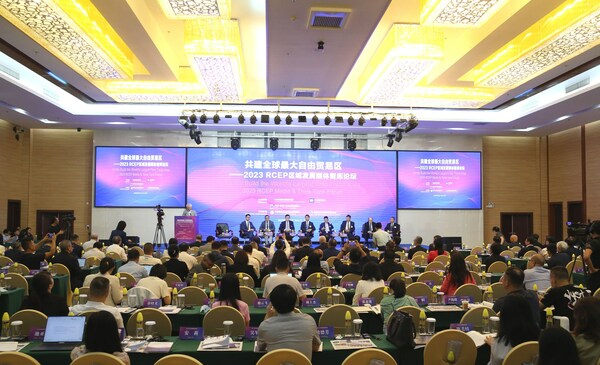Hainan expected to give full play to RCEP's role
- Written by PR Newswire Asia - News Pronto RSS
BEIJING, May 23, 2023 /PRNewswire/ -- A news report from chinadaily.com.cn:
 Experts listen to a keynote speech on regional cooperation during a plenary meeting of the third annual RCEP Media & Think Tank Forum in Haikou, Hainan province, on Sunday. ZOU HONG/CHINA DAILY
Experts listen to a keynote speech on regional cooperation during a plenary meeting of the third annual RCEP Media & Think Tank Forum in Haikou, Hainan province, on Sunday. ZOU HONG/CHINA DAILY
The Regional Comprehensive Economic Partnership, the world's largest free trade agreement, will boost intraregional trade integration through lower tariffs and will accelerate the recovery and long-term growth and prosperity of the global economy, officials and experts said on Sunday.
As the world grapples with rising geopolitical tensions, increasing protectionism and unilateralism, and disruptions to industrial and supply chains, the trade pact — an open and inclusive cooperation system — will serve as a solid path toward mutual benefits, they added.
They made the remarks on Sunday in Haikou, Hainan province, at the third annual RCEP Media &Think Tank Forum, whose theme this year was "Jointly Build the World's Largest Free Trade Area".The forum was held by the Publicity Department of the Communist Party of China Hainan Provincial Committee, China Daily and the China Institute for Reform and Development.
The trade pact, signed by 15 Asia-Pacific countries in November 2020, will be fully implemented among all member economies on June 2. The signatories are China, Australia, Japan, New Zealand and South Korea, as well as the 10 states of the Association of Southeast Asian Nations.
Wang Bin, a member of the Standing Committee of the CPC Hainan Provincial Committee and head of the provincial Party committee's Publicity Department, said that the Hainan Free Trade Port will better take advantage of the RCEP and align with international economic and trade rules, in order to foster an institutional environment with global competitiveness and to open up wider and at higher levels.
Hainan is well positioned to serve as an important hub for comprehensive strategic cooperation between China and ASEAN countries due to its geographic proximity, Wang said. Furthermore, Hainan will make ASEAN a high priority in its cooperation agenda to promote bilateral trade and two-way investment and to push forward the new round of upgrade of the China-ASEAN Free Trade Area, he added.
The province will also make good use of the RCEP's institutional advantages and Hainan's immense marine resources to scale up cooperation with RCEP member countries in such fields as marine ecosystem conservation and marine science-technology innovation, in order to promote sustainable marine development, Wang said.
In addition, efforts will be made to forge Hainan into a vital intersection between China and the RCEP member economies, to further tap into policy effects and advance regional integrated development, he said.
Qu Yingpu, publisher and editor-in-chief of China Daily, said that peace and development — the themes of the times — are now facing severe challenges due to deepening geopolitical tensions, rising protectionism and other risk factors.
Solidarity and cooperation are the answer to help contend with uncertainty and instability and to stand against bullying and zero-sum games, Qu said. The RCEP, which pursues mutually beneficial cooperation, will facilitate the steady recovery and growth of the regional economy and inject new impetus into global development and prosperity, he added.
Qu noted that the RCEP is not only the world's largest and most dynamic free trade area with the greatest growth potential, but also boasts the biggest population of young people, who are the backbone in fueling regional development.
Building on the good momentum, all parties concerned should provide broader platforms for the younger generation to showcase their talents and attract more of them to participate in the high-quality implementation of the RCEP, Qu said. Such efforts will enable them to contribute their part and advance the building of a community with a shared future for mankind, he added.
Chi Fulin, president of the China Institute for Reform and Development, said that the RCEP places a high premium on shared development, which will promote inclusive regional development and global economic growth.
The trade pact has established a mutually beneficial economic partnership that will facilitate the expansion of regional trade and investment, Chi said. Its progress proves that market- and rules-based regional economic cooperation is dynamic and has great vitality, and it will deliver long-term, sustainable growth to the region, he added.
High-standard opening-up is a key goal of the RCEP, and the openness pledged in the agreement should be fulfilled without delay, Chi said.
Moreover, he said, the alignment and integration of the RCEP with the Comprehensive and Progressive Agreement for Trans-Pacific Partnership will be advanced when appropriate, and efforts will be made to lay the groundwork for expediting the establishment of the Asia-Pacific free trade area.
The ASEAN countries and China provide the vitality and center of gravity for the RCEP region, and advancing the new round of upgrade of the China-ASEAN Free Trade Area is key to promoting the RCEP's high-level opening-up, he added.
Ong Tee Keat, chairman of the Centre for New Inclusive Asia and former Malaysian minister of transportation, said it is no easy task to integrate the 15 RCEP economies, which stretch across the Asia-Pacific region and are of diverse sizes and cultures as well as quality and levels of development, creating a huge single market of 2.2 billion people.
The RCEP is a game changer and has transformed the economic landscape worldwide by positioning the Asia-Pacific region as a new center of gravity for global trade, he said.
It brings vast investment opportunities and greater market access to business communities in most of the emerging economies in the region, he added.
Read more https://www.prnasia.com/story/archive/4108046_AE08046_0

